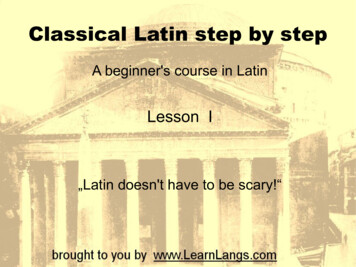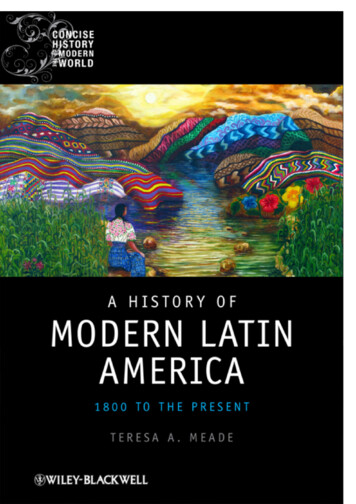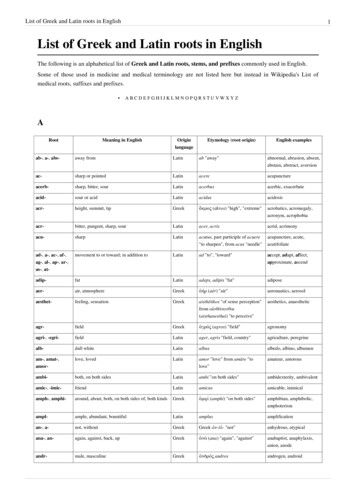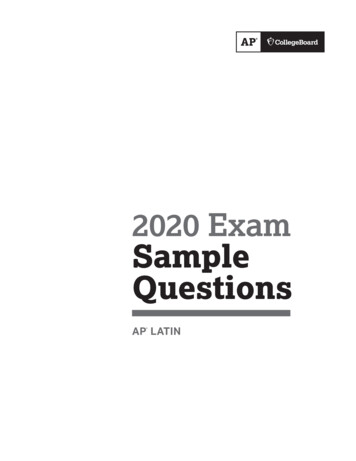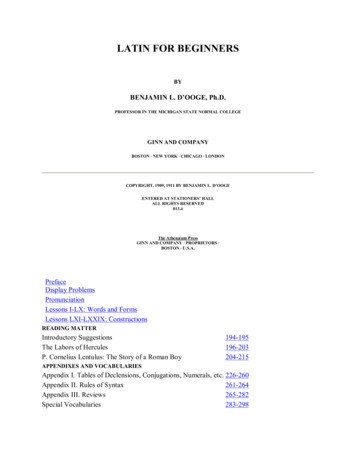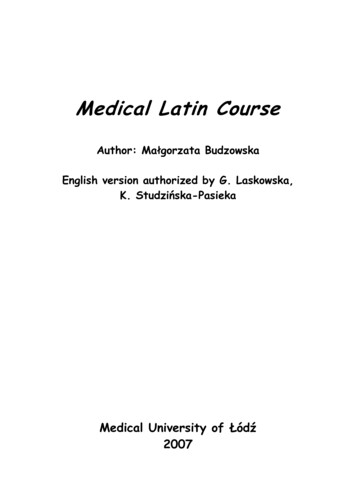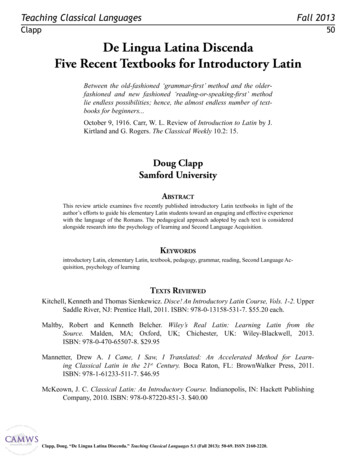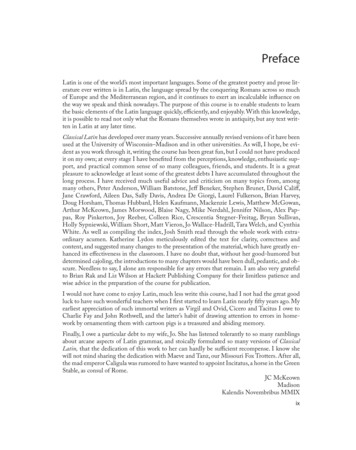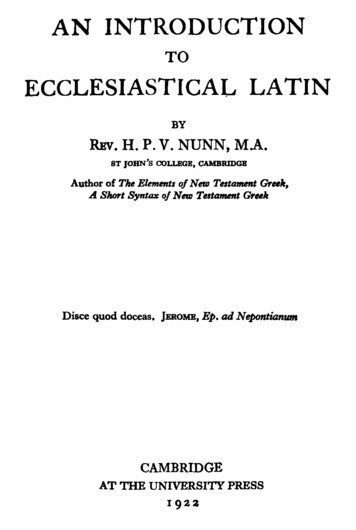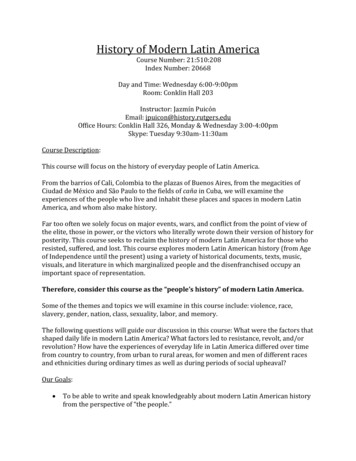
Transcription
History of Modern Latin AmericaCourse Number: 21:510:208Index Number: 20668Day and Time: Wednesday 6:00-9:00pmRoom: Conklin Hall 203Instructor: Jazmín PuicónEmail: jpuicon@history.rutgers.eduOffice Hours: Conklin Hall 326, Monday & Wednesday 3:00-4:00pmSkype: Tuesday 9:30am-11:30amCourse Description:This course will focus on the history of everyday people of Latin America.From the barrios of Cali, Colombia to the plazas of Buenos Aires, from the megacities ofCiudad de México and São Paulo to the fields of caña in Cuba, we will examine theexperiences of the people who live and inhabit these places and spaces in modern LatinAmerica, and whom also make history.Far too often we solely focus on major events, wars, and conflict from the point of view ofthe elite, those in power, or the victors who literally wrote down their version of history forposterity. This course seeks to reclaim the history of modern Latin America for those whoresisted, suffered, and lost. This course explores modern Latin American history (from Ageof Independence until the present) using a variety of historical documents, texts, music,visuals, and literature in which marginalized people and the disenfranchised occupy animportant space of representation.Therefore, consider this course as the “people’s history” of modern Latin America.Some of the themes and topics we will examine in this course include: violence, race,slavery, gender, nation, class, sexuality, labor, and memory.The following questions will guide our discussion in this course: What were the factors thatshaped daily life in modern Latin America? What factors led to resistance, revolt, and/orrevolution? How have the experiences of everyday life in Latin America differed over timefrom country to country, from urban to rural areas, for women and men of different racesand ethnicities during ordinary times as well as during periods of social upheaval?Our Goals: To be able to write and speak knowledgeably about modern Latin American historyfrom the perspective of “the people.”
Understand the relationship between previous social categories and systems ofgovernance and present unequal relationships among different cultural, racial, andgender groups.Understand the difference between a primary source and a secondary source, andbe able to engage and use both effectively.Constantly reflect upon and be engaged with material presented in class byexpressing thoughts through journal entries.Construct a clearly written and organized essay with a strong thesis statement andsufficient evidence comparing popular culture (film) to historical material coveredin class readings and lectures.The Rules: Attendance is mandatory and will be taken at every class meeting. Attendance ispart of your grade. Arriving to class late or leaving early is not allowed. There are no“make-up” opportunities for missed classes. All work must be handed in and/or submitted by the established deadline. Period.In the case of medical emergency, please speak to me as soon as possible so we cancome to some sort of accommodation. Come to each class with a notebook and a pen or pencil. Email, texting, and socialmedia can wait and are a distraction to the discussion and lecture. Therefore, noelectronic devices of any kind (cell phone, laptops, tablets, smart watches,etc.) will be allowed in the classroom. Sufficient evidence of the benefits ofwriting down notes has been established by the scientific community. Please see thefollowing article: tudents-put-your-laptops-away. The history, stories, images, and sounds we will be exploring in class may besensitive topics for certain students. Therefore, I expect all students to behave in amanner that shows respect for all parties involved. The classroom is a safe space forthe respectful exchange of opinions. Any behavior that might be disruptive to otherstudents or in any way intimidates them from participating in class is prohibited. Inaddition, points will be taken away from the participation grade and/or the studentwill be reported for any intimidating behavior.Student Responsibilities: Familiarize yourself and comply with the contents of this syllabus. Procure the required textbook.
Come prepared and be on-time for class. Attendance is taken during the first fiveminutes of class. If you are not in your seat by then, you will be considered absent.In addition, lateness may be considered an unexcused absence (see below). Be ready to be called on and/or participate in class discussion and lecture. Keep up-to-date with the course on email/Blackboard for announcements,additional readings and resources, and submission of written assignments(including journal assignments).Please note: Besides required textbook, all other readings will be available onBlackboard. Notify the instructor of any problems as soon as possible. This applies to allabsences (excused and unexcused absences). The Rutgers-NewarkUndergraduate catalog states: “The recognized grounds for absence are illnessrequiring medical attention, curricular or extracurricular activities approved by thefaculty, personal obligations claimed by the student and recognized as valid,recognized religious holidays, and severe inclement weather causing dangeroustraveling conditions.” See link for more nwk-ug current/pg563.htmlI will allow one unexcused absence, which must be self-reported using your onlineRutgers account. Additional absences will result in a one % point reduction ofyour final grade. Any student who misses four classes through any accumulationof excused or unexcused absences will not earn credit for the course. Such studentsshould withdraw to avoid getting an F.Students with disabilities: From the University’s Office of Disability Services webpage, “Rutgers Universitywelcomes students with disabilities into all of the University's educationalprograms. In order to receive consideration for reasonable accommodations, astudent with a disability must contact the appropriate disability services office atthe campus where you are officially enrolled, participate in an intake interview, andprovide umentationguidelines. If the documentation supports your request for reasonableaccommodations, your campus’s disability services office will provide you with aLetter of Accommodations. Please share this letter with your instructors and discussthe accommodations with them as early in your courses as possible.”Academic Integrity:There is no room in this classroom for plagiarism and cheating. These are veryserious offenses and will not be tolerated.
Although familiarizing yourself with the entirety of Rutgers’ University Code of StudentConduct is recommended, you must read the first four pages of Rutgers’ Academic IntegrityPolicy s/sites/46/2014/12/AI Policy 2013.pdf in order to continue in this course.You will be required to sign and date that you have indeed read and understood these firstfour pages of the Policy, which will be uploaded to Blackboard. This is required so that weare all on the same page when it comes to plagiarism and cheating in the classroom.In addition, as is listed on the second page of Rutgers’ Academic Integrity Policy: “Rutgershas adopted the following honor pledge to be written and signed on examinations andmajor course assignments submitted for grading: ‘On my honor, I have neither received norgiven any unauthorized assistance on this examination (assignment).’” Signing this pledgewill be required on your Film Essay, Midterm and Final Exams, and other assignments.In general, you may use assigned readings in this syllabus only and my lectures to completethe assignments, quizzes, essays, and exams. This means you cannot use other means (i.e.Wikipedia) to answer questions and/or fulfill assignments because it will not beconsidered your own work.The penalties for plagiarism and cheating are severe. You may receive a failing grade forthe assignment and/or course and may even be “kicked out” of the University. If you arecaught cheating during any exam/quiz or assignment, you will receive zero credit for theassignment or exam/quiz. If you plagiarize, you will receive zero credit and you will bereported to the Department and University administration.In conclusion, DO NOT CHEAT OR PLAGARIZE.Keys for Success:In order to fully appreciate and succeed in this course, you will need to effectively manageyour time. All of the resources you will need, with guidelines and deadlines, are listed inthis syllabus and/or on Blackboard. This course requires you to think critically.Plan ahead. Don’t wait until the last minute to communicate. Use office hours. Go to theWriting Center. Make use of all the resources the University has to offer.Any questions/concerns with syllabus, assignments, grades, etc. should be addressed toinstructor during office hours/Skype hours. Emails written after 9:00pm will most likelynot be answered until following day at the earliest.Requirements:Textbook (available at University bookstore and online): Meade, Teresa A. A History ofModern Latin America: 1800 to the Present. 2nd edition. Wiley-Blackwell. 2016. ISBN 9781-118-77248-5.
Films (available online or on reserve at Dana Library): La última cena, Tomás Gutiérrez Alea (1976) No! State of Fear Even the RainGrades:Attendance/Participation: Again, you must attend all classes. You will be allowed oneunexcused, self-reported absence. If you are late, you will be considered absent and yourlateness will count towards your unexcused absence total. Additional unexcused absences(after the first) will result in a one % point reduction of your final grade. The rest of yourparticipation grade will be made up of your daily classroom participation in discussion anddebate, and asking and answering questions. If you are physically not here for class, youcannot participate, and therefore, you will receive no credit for participation that day.Quizzes: There will be six pop quizzes periodically given during the first few minutes ofclass. You will be able to drop the lowest grade on these quizzes and I will only count fiveof the quizzes toward your final quiz grade.Journal Assignments (total of 10): In order to facilitate discussion in the classroom and toalso make sure everyone has done the reading, online journal entries will be due onBlackboard by 12 midnight the night before (Tuesday at midnight). These journal entriesmust be at least two pages in length (at least 1000 words) and be clearly written. Thepurpose of the journal entries are to demonstrate your engagement with the material,prove that you are keeping up with the reading assignments, and also to showcase yourability to think critically and express your thoughts in a clear manner. I will provide aworksheet with prompts that can be used to begin your thought process. Keep in mind thatjournal entries are required for every class session unless otherwise indicated. However, Iwill allow you to skip two journal entries. Therefore, only 10 will be counted toward yourfinal grade. It is your responsibility to keep track of how many journal assignments youhave completed/fulfilled.Film Review: You must choose one of the films required for this course and write a fivepage essay that integrates the themes raised in class lectures and in class readings with thefilm. Typical film reviews—that deal solely with the film and do not link it integrally withthe readings and lectures— are not acceptable and will receive no credit. I am not lookingfor a film review à la Roger Ebert. I am looking for a well-organized, clearly written essaywith a strong thesis statement and sufficient evidence comparing and contrastingdepictions of popular culture (film) to historical material covered in class readings andlectures. The film essay will be due two weeks from suggested film date on syllabus. Awriting/grading rubric will be uploaded to Blackboard for reference.
Midterm Exam/Final Exam: These exams will include: map identification section, shortanswers, and an essay. A study guide will be given in advance for both exams.Grade Break-down:Attendance/Participation 5%Quizzes (total of 5) 15%Journal Assignments (total of 10) 25%Film Essay 15%Midterm Exam 20%Final Exam 20%All materials assigned in this syllabus may be included in exams, and lectures may be used forcontext and citations in assignments.The contents of this syllabus are subject to change at the instructor’s discretion.* Journal Entry RequiredClass ScheduleUnit 1: Aftermath of Independence & Creating New NationsTopics we will cover: Reverberations of wars of independence. Impact on previous social, economic, and political systems of governance. Who is fighting for what and why? Who gets to claim citizenship and who does not? Who gets left out of the creation/citizenship process? Who is making history? Who is not? Look at silences, trauma, and violence inprocess of making/writing history.Key Terms:Gender, race, nation, citizen(ship), patriarchy, masculinity, slaverySession 1 (Wed. Sept. 7th): Introduction/Latin America before the Wars of Independence Meade, Chapter 1 (pgs. 1-23)Meade, Chapter 2: Sections – “Disorder and Rebellion” through “On the Road toIndependence” (pg. 39-44)Tupac Amaru’s letter (primary resource), “Tupac Amaru Protests the Mita to theAudencia of Lima” (1777)*Session 2 (Wed. Sept 14th): Slavery in the Americas/Making History: Haitian Revolutionand its Aftermath
*Meade, Chapter 3: Sections - “African Slavery in the Americas” through “Resistanceand Rebellion” (pgs. 53-65)Meade, Chapter 3: Sections – “The Sugar Colony of Saint-Domingue” through “TheRevolution Betrayed” (pg. 65-69)Michel-Rolph Trouillot, “Silencing the Past: Layers of Meaning in the HaitianRevolution” – entire article.Laurent Dubois, Avengers of the New World: The Story of the Haitian Revolution,Prologue and selected chapters.Suggested Film: La última cena (The Last Supper), Tomás Gutiérrez Alea, 1976.https://www.youtube.com/watch?v g CPbHIgnF4. (Essay due in 2 weeks bybeginning of Session 4)Reminder: Journal Entry for Session 2 due by Tues. Sept. 13th at Midnight toBlackboard.*Session 3 (Wed. Sept. 21st): Creating New Nations: Multiracial Pluralities/Women &Gender in New Nations *Meade, Chapter 4: Beginning of chapter through section “Post-independencePolitics” (pgs. 84-91); Sections - “After Caudillismo” through “Race, Race Mixture,and Liberalism” (pgs. 96-100)José Martí essay (primary source), “Our America.”Marixa Lasso, “Race War and Nation in Caribbean Grand Colombia, Cartagena, 18101832.” – start on page 341.Meade, Chapter 4: Sections – “Gender and Liberalism” through “Intersection ofGender, Race, and Class” (pgs. 100-105)Sarah Chambers, “What Independence Meant for Women.”Rebecca Earle, “Rape and the Anxious Republic: Revolutionary Colombia, 18101830.”Reminder: Journal Entry for Session 5 due by Tues. Sept. 20th at Midnight.Unit 2: Latin America Entering the 20th Century: Labor, Citizenship, and PoliticsTopics we will cover: Immigration policies and politics. Remnants of previous social, economic, and political systems of governance vs.changes occurring in early 20th century. What happens to “the people” during this era? Compare/contrast to previous timeperiods. Who is fighting for what and why? Who gets to claim citizenship and who does not? Who gets left out of the creation/citizenship process? Who is making history? Who is not? Look at silences, trauma, and violence inprocess of making/writing history.Key Terms:
Gender, race, nation, citizen(ship), colonization, labor, masculinity, motherhood, family*Session 4 (Wed. Sept. 28th): Race, Gender, and Nation: US Intervention in Caribbean inearly 20th century *Meade, Chapter 5 – “Independence at Last? Cuba and Puerto Rico” through to end ofchapter (pgs. 131-139).Eileen Findley, Imposing Decency: The Politics of Sexuality and Race in Puerto Rico,1870-1920, selected chapters.Teresita Martinez Vergne, Nation & Citizen in the Dominican Republic, 1880-1916,selected chapters.Ada Ferrer, “Cuba, 1898: Rethinking Race, Nation, and Empire.” Radical HistoryReview 73 (January 1999): 22-46.Reminder: Journal Entry for Session 4 due by Tues. Sept. 27th at Midnight.*Session 5 (Wed. Oct. 5th): Women & Gender in 20th Century Nation-Building: Countrysnapshot – Brazil *Peter Beattie, “The House, the Street, and the Barracks: Reform and HonorableMasculine Space in Brazil, 1864-1945.”Susan K. Besse, Restructuring Patriarchy: The Modernization of Gender Inequality inBrazil, 1914-1940, selected chapters (incl. Chapter 6).Barbara Weinstein, “Inventing the Mulher Paulista: Politics, Rebellion, and theGendering of Brazilian National Identities.”Reminder: Journal Entry for Session 5 due by Tues. Oct. 4th at Midnight.Midterm Study Guide Handed Out*Session 6 (Wed. Oct. 12th): Labor & Economic Modernization of Nation *Ann Farnsworth-Alvear, Dulcinea in the Factory: Myths, Morals, Men, and Women inColombia’s Industrial Experiment, 1905-1960, selected chapters (incl. Chapter 1).Gould, Jeffrey L. and Aldo Lauria-Santiago. To Rise in Darkness: Revolution,Repression, and Memory in El Salvador, 1920-1932, selected chapters (incl. Chapters1-2).Reminder: Journal Entry for Session 6 due by Tues. Oct. 11th at Midnight.Session 7 (Wed. Oct. 19th): Midterm Exam In-class, closed book midterm.No electronic devices (including cell phones) allowed in class.Exam may include: map identification section, short answer section, and an essay.Unit 3: Latin America in the 20th Century: Revolution, Repression, and Resurgence of “thePeople”
Topics we will cover: Who is fighting for what and why? What happens to “the people” during this century? Compare/contrast to previouseras. Who is making history? Who is not? Look at silences, trauma, and violence inprocess of making/writing history.Key Terms:Socialism, capitalism, democracy, violence, blackness/Afro- , torture, gender,nation, citizen(ship), labor, music*Session 8 (Wed. Oct. 26th): Revolution, Violence, and Perceptions of Blackness – Haiti,Dominican Republic, and Cuba *Matthew J. Smith, “Vive 1804! The Haitian Revolution and the RevolutionaryGeneration of 1946,” Caribbean Quarterly, 2004.Richard Lee Turits, “A Nation Imposed: The 1937 Haitian Massacre in the DominicanRepublic,” in Hispanic American Historical Review 82.3 (2002) 589-635.Robin D. Moore, Nationalizing Blackness: Afrocubanismo and Artistic Revolution inHavana, 1920-1940, Chapters 1 & 5.Reminder: Journal Entry for Session 8 due by Tues. Oct. 25th at Midnight.*Session 9 (Wed. Nov. 2rd): Citizenship, Masculinity, and the Working Class in Modern LatinAmerica *Thomas Klubock, Contested Communities: Class, Gender, and Politics in Chile’s ElTeniente Mine, selected chapters.Brenda Elsey, “The Independent Republic of Football: The Politics of NeighborhoodClubs in Santiago, Chile, 1948-1960.”Boxing in Mexico – selections from Stephen Allen’s work.Reminder: Journal Entry for Session 9 due by Tues. Nov. 1st at Midnight.*Session 10 (Wed. Nov. 9th): Socialism/Populism in Latin America in 20th Century: CountrySnapshots – Argentina & Chile *Meade, Chapter 9: Sections – Beginning of Chapter through “Politics Engendered”(pgs. 198 – 208).Daniel James, Doña María’s Story, selected chapters.Juan Perón (primary source), “Declaration of Workers’ Rights.” (1947)Meade, “The Chilean Road to Socialism” through “The Chilean Road to SocialismDead Ends” (pgs. 267-270)Peter Winn, Weavers of Revolution: The Yarur Workers and Chile’s Road to Socialism,selected chapters (incl. Chapter 10).Suggested Film: No!Reminder: Journal Entry for Session 10 due by Tues. Nov. 8th at Midnight.
*Session 11 (Wed. Nov. 16th): Violence, Suppression, and Torture *Temma Kaplan’s “Reversing the Shame and Gendering the Memory,” in Signs:Journal of Women in Culture and Society, vol.28, no.11, 2002.Greg Grandin, The Last Colonial Massacre: Latin America in the Cold War, selectedchapters.Choose a primary or secondary source – (victim testimony, declassified CIAdocument, newspaper article, fiction literature piece on subject) – and share in class.Reminder: Journal Entry for Session 11 due by Tues. Nov. 15th by Midnight.No class on Wed. Nov. 23rd*Session 12 (Wed. Nov. 30th): Fighting for Democracy *Meade, “Urban Guerrilla Warfare: Argentina” through “Mothers of the Plaza deMayo” (pgs. 272-278).Temma Kaplan, Taking Back the Streets: Women, Youth, and Direct Democracy,selected chapters.Selections from testimonies of Madres de la Plaza de Mayo.Augusto Pinochet (primary source), “Letter to all Chileans.”Suggested Film: Even the RainReminder: Journal Entry for Session 12 due by Tues. Nov. 29th at Midnight.*Session 13 (Wed. Dec. 7th): El Son de las Americas: Music in Latin America *Eric Zolov, Refried Elvis: The Rise of the Mexican Counterculture, Chapter 1.César Miguel Rondón, The Book of Salsa: A Chronicle of Urban Music from theCaribbean to New York City, Chapters 1-4.Selections from Jazmín Puicón’s dissertation on violence, community organizing,and democracy in Colombia.Reminder: Journal Entry for Session 13 due by Tues. Dec. 6th at Midnight.Final Exam Study Guide Handed Out*Session 14 (Wed. Dec. 14th): After violence, viene la paz? Human Rights in Latin America Grandin, Greg. “The Instruction of Great Catastrophe: Truth Commissions, NationalHistory, and State Formation in Argentina, Chile, and Guatemala.” The AmericanHistorical Review 110, No. 1 (February 2005): Pp. 46-67.Meade, “Movements for Revolutionary Change: Peru” through “Repression andFujimori” (pgs. 280-285).Exploring Human Rights Commission Documents – Colombia, Peru, Argentina,Central America (primary/secondary documents).Suggested Film: State of Fear
*Reminder: Journal Entry for Session 14 due by Tues. Dec. 13th at Midnight.Final Exam: Wednesday, Dec. 21 – 6:20-9:20pm, Location TBA In-class, closed book final exam.No electronic devices (including cell phones) are permitted.Exam may include: map identification section, short answer section, and an essay.
Procure the required textbook. . Modern Latin America: 1800 to the Present. 2nd edition. Wiley-Blackwell. 2016. ISBN 978-1-118-77248-5. Films (availabl
